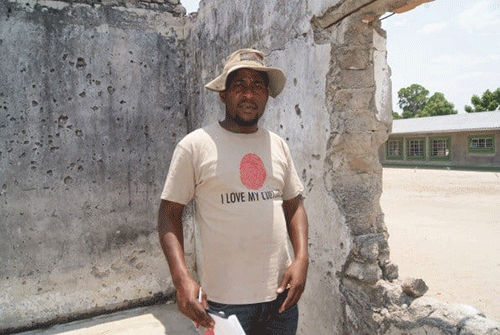Kleopas Nghikefelwa
In 2008, when I obtained my Higher Diploma in Visual Arts at the University of Namibia, I decided to dedicate myself to the development of arts and cultural activities in Namibia.
I was fortunate to be awarded a three-month cultural exchange programme in Berlin, Germany in 2009. This inspired me to choose a career in arts and culture because I have seen the whole Western world value, appreciate, and acknowledge art and culture even more.
On my return to Namibia, I joined the Desert Research Foundation (in LIPROSAN) Livelihood Project for San People), to promote San People’s Art and cultural activities in the Okongo community. Later I was hired by the National Heritage Council of Namibia to serve as a curator officer, at Eenhana Shrine National Heritage Site, from 2009 to 2014.
Late minister of youth, sport, arts and culture, Kazenambo Kazenambo, appointed me to serve as a member of the board of trustees of the National Arts Gallery of Namibia from 2011 to 2013.
As they say, when a fish grows bigger, it finds it hard to swim in a small pond or river. I decided to move to Windhoek, where I have been working as a museum technician, at the Office of the Vice President/Ministry of Defence and Veterans Affairs, which documents the history of Namibia Liberation Struggle Heritage. In 2021, my dream to study further forced me to resign from my full-time job and I enrolled for a Bachelor of Arts in History and Arts at the University of Namibia, in 2021.
Since my graduation, I have been involved in multiple cultural research projects that promote Namibian arts, heritage, cultural tourism and museum development.
In my struggle to preserve, promote and share Namibian arts and culture, I encountered some challenges that were beyond my control. One major challenge is the poor investment by private and public cultural institutions in the promotion of Namibian arts and cultural heritage, especially in Namibia’s rural areas, where the majority of communities are based.
I therefore, see an urgent need to decentralise resources for arts and cultural development from Windhoek to all corners of Namibia. Placing cultural officers and arts extension officers all over the country without sufficient facilities, tools, and budget will not help us to promote arts and cultural activities in those areas. We are truly experiencing a shortage of funding and investment to promote cultural activities in our rural communities.
Socially, arts and cultural activities can also contribute to the social wellness and well-being of our people in rural areas where we have no National Art Gallery, National Theatre, national museums, libraries and cultural centres. Among some of our traditional communities, it is always good to see people happy during traditional weddings, Omagongo, Olufuko, Oshipe and Omaludi and Efundula festivals, amongst others. These cultural events present an opportunity to promote cultural tourism in rural areas and create more jobs for our unemployed youth.
However, the lack of recognition of Namibia’s cultural and heritage resources is among the major obstacles to rural development. This observation is also backed by findings of a recently-launched report titled ‘National strategy on sustainable heritage tourism development and employment creation opportunities at community level’.
But let us hope that the future will be bright for Namibia’s arts and culture sectors because they have been receiving good technical support at the international and national levels.
Notably, Unesco’s head in Namibia, Jean-Pierre Ilboudo, acknowledged Namibia’s successful inscription of Oshituthi shomagongo, the marula juice festival, on the ‘Representative List of the Intangible Heritage of Humanity’. He emphasized the importance of culture as a powerful contributor to economic development, social stability, and environmental protection.
Ilboudo also said Unesco was pleased with the efforts of the Namibian government “as no development can be sustainable without a strong culture component”.
“As Unesco, we are happy that in Namibia, culture is viewed as a sector of activity, through tangible and intangible heritage, creative industries and various forms of artistic expressions, which make it a powerful contributor to economic development, social stability and environmental protection,” he said.
UN secretary general Antonio Guterres emphasised this during the 2021 Africa Dialogue Series when he said: “Let us use Africa’s rich heritage as a ‘catalyst’ for transformation.”
UN General Assembly president Volkan Bozkir elaborated: “Culture shapes our identities…gives meaning, purpose and a sense of belonging…and is imperative for social cohesion.”
I am happy that indeed, the African Union (AU) has also prioritised arts for only the second time in its history with its 2021 theme, “Arts, Culture and Heritage: Levers for Building the Africa We Want”.
But the main problem is to have arts and culture as non-promotional subjects in Namibia’s school curriculum. This will motivate and inspire the Namibian youth to pursue careers in arts and culture at university level.
* Kleopas Nghikefelwa is an intern curator at Onandjokwe Medical Museum


